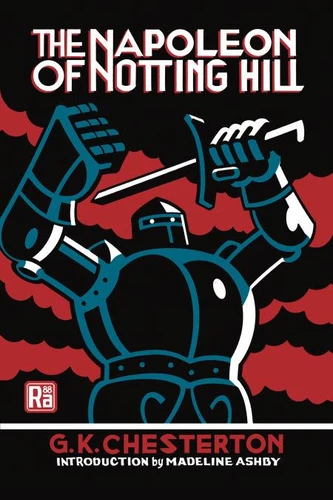The Napoleon of Notting Hill
Par : ,Formats :
Disponible dans votre compte client Decitre ou Furet du Nord dès validation de votre commande. Le format ePub protégé est :
- Compatible avec une lecture sur My Vivlio (smartphone, tablette, ordinateur)
- Compatible avec une lecture sur liseuses Vivlio
- Pour les liseuses autres que Vivlio, vous devez utiliser le logiciel Adobe Digital Edition. Non compatible avec la lecture sur les liseuses Kindle, Remarkable et Sony
- Non compatible avec un achat hors France métropolitaine
 , qui est-ce ?
, qui est-ce ?Notre partenaire de plateforme de lecture numérique où vous retrouverez l'ensemble de vos ebooks gratuitement
Pour en savoir plus sur nos ebooks, consultez notre aide en ligne ici
- Nombre de pages248
- FormatePub
- ISBN978-0-262-37604-4
- EAN9780262376044
- Date de parution01/08/2023
- Protection num.Adobe DRM
- Taille438 Ko
- Infos supplémentairesepub
- ÉditeurThe MIT Press
Résumé
A satire set in a future England, in which a neomedievalist contest among London neighborhoods takes a disastrous turn. When Auberon Quin, a prankster nostalgic for Merrie Olde England, becomes king of that country in 1984, he mandates that each of London's neighborhoods become an independent state, complete with unique local costumes. Everyone goes along with the conceit until young Adam Wayne, a born military tactician, takes the game too seriously . . .
and becomes the Napoleon of Notting Hill. War ensues throughout the city-fought with sword and halberd!G. K. Chesterton (1874-1936) was an English author, poet, critic, and newspaper columnist known for his brilliant, epigrammatic paradoxes. His best-known character is the priest-detective Father Brown, featured in over fifty stories published between 1910 and 1936, who solves mysteries and crimes thanks to his understanding of spiritual and philosophic truths; and his best-known novel is The Man Who Was Thursday (1908), a metaphysical thriller.
In addition to The Napoleon of Notting Hill, his first novel, he wrote several other near-future satires of England.
and becomes the Napoleon of Notting Hill. War ensues throughout the city-fought with sword and halberd!G. K. Chesterton (1874-1936) was an English author, poet, critic, and newspaper columnist known for his brilliant, epigrammatic paradoxes. His best-known character is the priest-detective Father Brown, featured in over fifty stories published between 1910 and 1936, who solves mysteries and crimes thanks to his understanding of spiritual and philosophic truths; and his best-known novel is The Man Who Was Thursday (1908), a metaphysical thriller.
In addition to The Napoleon of Notting Hill, his first novel, he wrote several other near-future satires of England.
A satire set in a future England, in which a neomedievalist contest among London neighborhoods takes a disastrous turn. When Auberon Quin, a prankster nostalgic for Merrie Olde England, becomes king of that country in 1984, he mandates that each of London's neighborhoods become an independent state, complete with unique local costumes. Everyone goes along with the conceit until young Adam Wayne, a born military tactician, takes the game too seriously . . .
and becomes the Napoleon of Notting Hill. War ensues throughout the city-fought with sword and halberd!G. K. Chesterton (1874-1936) was an English author, poet, critic, and newspaper columnist known for his brilliant, epigrammatic paradoxes. His best-known character is the priest-detective Father Brown, featured in over fifty stories published between 1910 and 1936, who solves mysteries and crimes thanks to his understanding of spiritual and philosophic truths; and his best-known novel is The Man Who Was Thursday (1908), a metaphysical thriller.
In addition to The Napoleon of Notting Hill, his first novel, he wrote several other near-future satires of England.
and becomes the Napoleon of Notting Hill. War ensues throughout the city-fought with sword and halberd!G. K. Chesterton (1874-1936) was an English author, poet, critic, and newspaper columnist known for his brilliant, epigrammatic paradoxes. His best-known character is the priest-detective Father Brown, featured in over fifty stories published between 1910 and 1936, who solves mysteries and crimes thanks to his understanding of spiritual and philosophic truths; and his best-known novel is The Man Who Was Thursday (1908), a metaphysical thriller.
In addition to The Napoleon of Notting Hill, his first novel, he wrote several other near-future satires of England.















